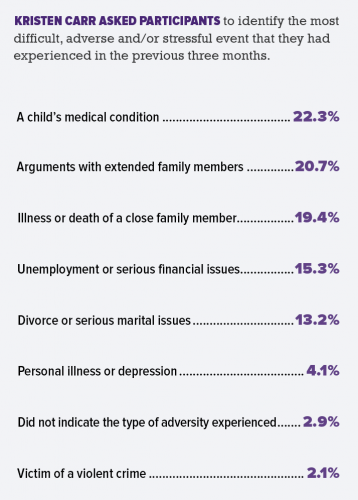Kristen Carr Studies Coping through Communication
A sympathetic ear can support healing after a stressful event.
Kristen Carr Studies Coping through Communication
A sympathetic ear can support healing after a stressful event.
Following a traumatic situation, how best to cope? Consider talking it out.

Getty Images © Tom Merton
It isn’t just good advice, said Kristen Carr, assistant professor of communication studies. She conducted a study to find out how different manners of thinking and talking through life’s rough spells influenced personal growth in their wake.
“I was curious how the stressful impact of adversity and the degree of rumination — that is, repetitive thinking and talking — affected the process of seeking social support,” she said.
Over a year, Carr asked online survey participants to identify the most difficult or stressful event they experienced in the previous three months. Responses included a child’s medical condition, family arguments, financial issues, divorce, depression and being the victim of a violent crime.
The professor asked a series of questions to assess the degree of stress using an ascending 7-point scale. “On average, participants reported that the stressful impact of the event was 3.73, indicating that these events were moderately to significantly stressful,” she said.
Survey participants also reported on their attempts to grapple with the negative event. Carr focused on “deliberate rumination” — purposeful, solution-oriented thinking about a problem, and “verbal co-rumination” — the incessant discussion of a problem with another person.
Although upsetting events led to a rise in both types of communication, Carr found that deliberate rumination increased the perceived risk of seeking social support, while verbal co-rumination decreased the perception of that risk.
Seeking the sympathies of others resulted in more post-traumatic growth. “This study demonstrates that after a significantly stressful experience, talking with others about that adversity is more beneficial than simply thinking about it yourself, even when those conversations are repetitive and predictable,” Carr said.
 “Having someone willing to repeatedly engage in discussions surrounding a particularly stressful experience is likely to provide a sense of relational closeness and solidarity, regardless of its effectiveness — or ineffectiveness — in solving the problem,” Carr said. “Perhaps it allows people to share the burden of that adversity with someone who cares about them, which makes the experience feel a bit less heavy and promotes healing and growth as a result.”
“Having someone willing to repeatedly engage in discussions surrounding a particularly stressful experience is likely to provide a sense of relational closeness and solidarity, regardless of its effectiveness — or ineffectiveness — in solving the problem,” Carr said. “Perhaps it allows people to share the burden of that adversity with someone who cares about them, which makes the experience feel a bit less heavy and promotes healing and growth as a result.”
Carr presented her findings in November at the National Communication Association Annual Convention in Philadelphia with the paper “Rumination and Perceived Risk in Seeking Social Support as Mediators of the Stressful Impact of Adversity and Post-Traumatic Growth.”
The professor is working on other projects to investigate resilience through the lens of interpersonal communication. “My overarching goal in this line of research is to better understand when talking about adversity helps,” Carr said. “And in contrast, under what circumstances conversations about stress are less productive or perhaps even harmful.”

Your comments are welcome
Comments
Related reading:
How do Hispanic parents cope with autism?
TCU student Kelcie Willis ’16 examined cultural variances in coping mechanisms.
Campus News: Alma Matters
Disaster Preparedness in Health Care
Hospitals must plan ahead or risk short staffing in crises, nursing professor finds.
Campus News: Alma Matters, Research + Discovery
Brenton Cooper’s Research on Vocal Learning
The psychology professor studies how songbirds develop the ability to make sounds, and his results could benefit humans.